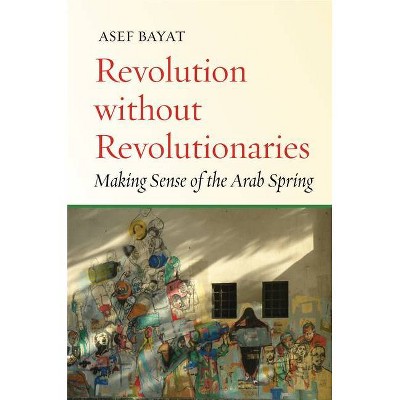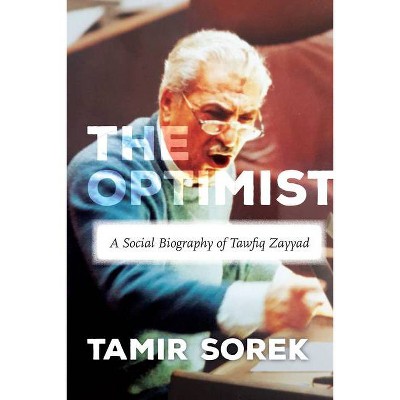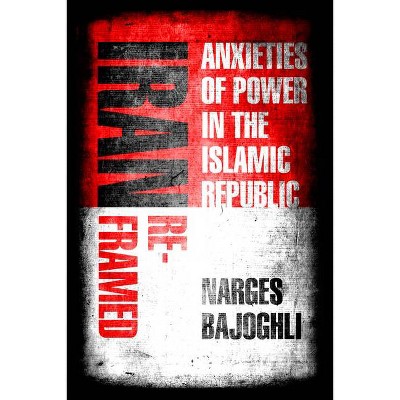Revolution Without Revolutionaries - (Stanford Studies in Middle Eastern and Islamic Societies and) by Asef Bayat (Paperback)

Similar Products
Products of same category from the store
AllProduct info
<p/><br></br><p><b> Book Synopsis </b></p></br></br><p>The revolutionary wave that swept the Middle East in 2011 was marked by spectacular mobilization, spreading within and between countries with extraordinary speed. Several years on, however, it has caused limited shifts in structures of power, leaving much of the old political and social order intact. In this book, noted author Asef Bayat-whose <i>Life as Politics</i> anticipated the Arab Spring-uncovers why this occurred, and what made these uprisings so distinct from those that came before.</p> <p><i>Revolution without Revolutionaries</i> is both a history of the Arab Spring and a history of revolution writ broadly. Setting the 2011 uprisings side by side with the revolutions of the 1970s, particularly the Iranian Revolution, Bayat reveals a profound global shift in the nature of protest: as acceptance of neoliberal policy has spread, radical revolutionary impulses have diminished. Protestors call for reform rather than fundamental transformation. By tracing the contours and illuminating the meaning of the 2011 uprisings, Bayat gives us the book needed to explain and understand our post-Arab Spring world.</p><p/><br></br><p><b> Review Quotes </b></p></br></br><br>...[T]his book not only provides a persuasive account of the Arab Spring and its aftermath, but it demonstrates the trajectory of social movements and activism under neoliberal hegemony on a global scale. It is an accessible and engaging read, one that will benefit activists as well as social movement scholars.--Simin Fadaee "<i>Social Movement Studies</i>"<br><br><i>Revolution without Revolutionaries</i> is compelling, important, accessible to a general readership and is a must-read for those interested in Middle Eastern studies, revolutionary movements, sociology and history, Political Islam, and, above all, for readers considering how neoliberalism affects our world today. Furthermore, there is an honesty and vulnerability that I have rarely seen so openly in academics' works that makes Bayat's latest all the more relatable.--Pouya Alimagham "<i>Social History</i>"<br><br>[T]his is a serious book that compares and explains the differences between previous Middle East and global revolutions and those of the last decade. A good scholarly contribution. Recommended--J. P. Dunn "<i>Choice</i>"<br><br>A laudable book: it deploys a distinctive analytical approach that yields a compelling narrative of the Arab uprisings. The volume will be particularly useful to readers new to Bayat's work, since it offers a cumulative presentation of his signature notions of post-Islamism, nonmovements, and refolution, in addition to his focus on urban space.--Marwan M. Kraidy "<i>Current History</i>"<br><br>An astute analyst of the Middle East, Asef Bayat is one of the very few researchers equipped to historicize the region's contemporary uprisings. In <i>Revolution without Revolutionaries</i>, he deftly and sympathetically employs his own observations of Iran, immediately before and after the 1979 revolution, to reflect on the epochal shifts that have re-worked the political regimes, economic structures, and revolutionary imaginaries across the region today.--Arang Keshavarzian "New York University"<br><br>Asef Bayat is in the vanguard of a subtle and original theorization of social movements and social change in the Middle East. His attention to the lives of the urban poor, his extensive field work in very different countries within the region, and his ability to see over the horizon of current paradigms make his work essential reading.--Juan Cole "University of Michigan"<br><br>Asef Bayat provocatively questions the Arab Spring's apparent moderation, tracing its softness to decades of neoliberalism that have undermined the national state and discarded old-fashioned forms of revolutionary violence. This groundbreaking book is not an obituary for the Arab Spring but a hopeful glimpse at its future.--Olivier Roy "author of <i>The Failure of Political Islam</i>"<br><br>Asef Bayat uses accessible language and style that engages the reader and asks her/him to actively participate and respond to the sensitive inquiries raised. Therefore, this book is highly recommended for students of sociology, anthropology, political science, and history, but also for a wider audience interested in Middle Eastern/Arab contemporary political affairs.--Mina Ibrahim "<i>KULT_online: Review Journal for the Study of Culture</i>"<br><br>Asef Bayat, famed for his <i>Life as Politics</i> (2010, 2013), presents us with a rich theoretical and empirical study of the 2011 revolutions colloquially known as the Arab Spring in <i>Revolution without Revolutionaries</i>...Bayat, an Iran-born, US-based sociologist from a working-class background who has a deep observational capacity to see and remember things as they unfolded in his own - first village - and then in the working-class Tehran neighbourhood where he grew up...The book would be of great value to scholars interested in revolutions, social movements, graduate students, and researchers of the Middle East politics.--Habibul Haque Khondker "<i>Canadian Journal of Sociology </i>"<br><br>Asef Bayat's impressive <i>Revolution Without Revolutionaries</i> tries to explain why nearly all the exhilarating uprisings in the Middle East eventually failed...Bayat is not the first scholar to tackle this issue, the field of Middle East studies having offered up its share of autopsies, but his lucid and readable account does provide the most plausible explanation. In the end, revolutions cannot succeed without leaders who have spent decades in oppositional politics honing their ideology and sharpening their strategy.--<i>Survival</i><br><br>Bayat addresses a prevailing tendency in contemporary political thought: celebrations of radical democracy as process without adequate consideration of outcomes....He inventively redirects the anticipated source of political imaginaries from vanguards to ordinary people.--Arash Davari "<i>Political Thory</i>"<br><br>Drawing upon comparison with the revolutionary movements of the 1970s...the author brings a rich repertoire of concepts and sociological theories to bear on his explanation....[H]is writing is surprisingly accessible and interspersed with sufficient historical context and ethnographic details that it should find a wider audience among those with interest in understanding the contemporary politics of the Arab region and contentious politics beyond the region.--Michaelle Browers "<i>Middle East Journal</i>"<br><br>One of the most significant and lasting achievements of the Arab revolutions, as Bayat points out, is the 'change in consciousness' marked by the brutal interruption on the political scene of both conservative and liberal ideas in debates as impassioned as they were unprecedented.--Alain Gresh "<i>Orient XXI</i>"<br><br>This is the kind of book that gives you an appetite to read it from cover to cover on a park bench or a beach. <i>Revolutions without Revolutionaries</i> deals with regions of the world that continue to dominate news headlines of major news outlets and which politicians build careers demonizing. The author brings an unprecedented, distinct perspective to elucidate and analyze the misconstrued perceptions and representations of these largely unknown Middle East and North Africa (MENA) states. He is a keen observer of the social and political life in its complexities and dynamism.--Sam Cherribi "<i>Social Forces</i>"<br><br>What makes Bayat's account different is the connection he makes between revolution and everyday life. He contests the conventional wisdom in the sociology of revolution that tends to tie revolution to a set of extraordinary sociopolitical events. Revolutionary moments are, rather, nested in the ordinary nature of our lives. Bayat's description of the order of events in the period before the Arab Spring demonstrates how a plethora of small-scale incidents of protest gave birth to the spirit of rebellion.--Ahmad Mohammadpour "<i>Middle East Policy</i>"<br><p/><br></br><p><b> About the Author </b></p></br></br><b>Asef Bayat</b> is the Catherine and Bruce Bastian Professor of Global and Transnational Studies and Professor of Sociology at the University of Illinois, Urbana-Champaign. He is the author of <i>Life as Politics: How Ordinary People Change the Middle East</i> (Stanford, 2009, 2013) and <i>Making Islam Democratic: Social Movements and the Post-Islamist Turn</i> (Stanford, 2007).
Price History
Price Archive shows prices from various stores, lets you see history and find the cheapest. There is no actual sale on the website. For all support, inquiry and suggestion messagescommunication@pricearchive.us



















